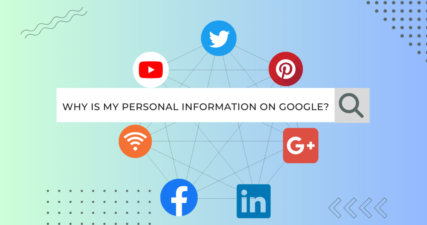What are the Types of Information That Can be Removed From the Internet?

Throughout the last years, there has been a growing concern about the permanence of information on the internet. With the vast amount of data that is constantly being generated and shared online, it can be difficult to keep track of what information is available and where it is stored. This has led many individuals to question whether certain types of information should be removed from the internet and, if so, what types of information can be removed.
In this article, we will investigate the various types of information that can be removed from the internet, including personal information, sensitive information, defamatory or libelous content, copyright infringement, and hate speech or harassment.
By understanding the legal frameworks and limitations surrounding the removal of these types of information, we can gain a better understanding of the balance between freedom of expression and the protection of individuals’ rights online.
Personal Information
Personal information refers to any data that can be used to identify a specific individual. Examples of personal information include a person’s name, address, phone number, email address, date of birth, social security number, your passport or other documents, and other identifying information. In many cases, individuals have a right to have their personal information removed from the internet.
I often come across situations where personal details surface on random websites or directories. Our personal information removal service is built to help clean that up and keep sensitive data under control.
GDPR
There are various legal frameworks that govern the removal of personal information from the Internet. For example, the General Data Protection Regulation (GDPR) in the European Union provides individuals with the right to have their personal data removed from search engines under certain circumstances.
COPPA
In the United States, the Children’s Online Privacy Protection Act (COPPA) requires websites to obtain parental consent before collecting personal information from children under the age of 13.
Despite these legal frameworks, there are challenges and limitations associated with the removal of personal information from the internet. One challenge is the sheer volume of data that is available online, which can make it difficult to locate and remove all instances of a particular individual’s personal information.
Moreover, some information may be subject to exemptions or exceptions under certain laws, making it difficult to remove even if an individual has a legal right to do so.
Finally, there may be issues of free speech and public interest that come into play, particularly in cases where personal information relates to a public figure or a matter of public concern.
As such, the removal of personal information from the internet is a complex issue that requires careful consideration of the various legal and ethical implications.
Sensitive Information
Sensitive information refers to any data that, if exposed or shared publicly, could harm an individual’s reputation, personal or financial security, or other important aspects of their life. Examples of sensitive information include medical records, financial information, and other personal data that individuals would not want to be made public.
The legal frameworks for the removal of sensitive information from the internet can vary depending on the jurisdiction and the type of information involved.
HIPPA
For example, in the United States, the Health Insurance Portability and Accountability Act (HIPAA) governs the privacy of medical information and provides individuals with certain rights to control the use and disclosure of their medical records.
FCRA
Similarly, the Fair Credit Reporting Act (FCRA) provides individuals with the right to dispute inaccurate or incomplete credit reports.
Challenges and limitations associated with removing sensitive information from the internet include the difficulty of locating and removing all instances of the information, particularly if it has been shared or copied across multiple platforms or websites.
Additionally, there may be exceptions or exemptions under certain laws that make it difficult to remove certain types of sensitive information, particularly if it is deemed to be in the public interest or related to a matter of public concern. Finally, the removal of sensitive information can also raise questions about freedom of expression and the public’s right to access information.
Overall, the removal of sensitive information from the internet is a complex issue that requires careful consideration of the various legal and ethical implications. It is important for individuals to be aware of their rights to privacy and to take steps to protect their sensitive information, but it is also essential to balance these rights against other important values, such as freedom of expression and the public’s right to access information.
Trademarks
Beyond personal attacks, businesses often face challenges with unauthorized use of their trademarks online. Such infringements can mislead consumers and dilute brand value. So it’s important to address such trademark violations to Google as soon as possible.
It’s essential to identify and act upon these violations to protect the company’s public image.
Defamatory or Libelous Content
Defamatory or libelous content refers to any content that is false and harms an individual’s reputation. This can include false statements about a person’s character, business practices, fake images, or other important aspects of their life. Defamatory or libelous content can be particularly damaging if it is published on the internet, as it can be easily shared and accessed by a broad audience.
The legal frameworks for the removal of defamatory or libelous content from the internet can vary according to the jurisdiction and the specific circumstances of the case. In general, individuals who have been the subject of defamatory or libelous content may have legal rights to seek damages or have the content removed. In some cases, websites or other online platforms may also have their own policies for removing defamatory or libelous content.
Main Challenges
Challenges and limitations associated with removing defamatory or libelous content from the internet include the difficulty of determining whether the content is actually defamatory or libelous.
Moreover, there may be limitations on the ability to remove the content, particularly if it is deemed to be protected under free speech or other legal principles. Finally, there may be challenges associated with enforcing legal judgments or orders to remove the content, particularly if it is hosted on servers in other countries or jurisdictions.
Overall, the removal of defamatory or libelous content from the internet is a complex issue that requires careful consideration of the various legal and ethical implications. While individuals have the right to protect their reputations and seek legal redress for false or damaging statements, it is also important to balance these rights against other important values such as freedom of expression and the public’s right to access information.

Copyright Infringement
Copyright infringement refers to the unauthorized use of copyrighted material, such as music, videos, images, or written works, without the permission of the copyright holder. This can include copying, sharing, distributing, or displaying copyrighted material without proper authorization.
I regularly see cases where original work is reposted without approval. Our DMCA takedown service helps protect that content and ensures it’s not reused or spread without permission.
The legal frameworks for the removal of copyright-infringing content from the internet can vary according to the jurisdiction and the specific circumstances of the case.
DMCA
In general, copyright holders have legal rights to seek damages or have the infringing content removed under the Digital Millennium Copyright Act (DMCA) in the United States or under similar laws in other countries. Online platforms, such as YouTube or social media platforms, may also have their own policies and procedures for responding to copyright infringement claims.
Challenges and limitations associated with removing copyright-infringing content from the internet include the difficulty of identifying all instances of the infringing content, particularly if it has been shared or copied across multiple platforms or websites.
Fair Use
Additionally, there may be issues related to the use of copyrighted material under the principle of fair use, which allows for limited use of copyrighted material for certain purposes such as criticism, commentary, news reporting, teaching, scholarship, or research. Finally, there may be challenges associated with enforcing legal judgments or orders to remove the content, particularly if it is hosted on servers in other countries or jurisdictions.
Overall, the removal of copyrighted content from the internet is a complex issue that requires careful consideration of the various legal and ethical implications. While copyright holders have the right to protect their intellectual property and seek legal redress for copyright infringement, it is also important to balance these rights against other important values, such as freedom of expression and the public’s right to access information.
Hate Speech or Harassment
Hate speech or harassment refers to any content on the internet that is intended to intimidate, threaten, or harm individuals or groups based on their:
- race;
- ethnicity;
- religion;
- gender identity;
- sexual orientation;
- or other characteristics.
This can include online bullying, cyberstalking, or the use of slurs or other derogatory languages.
The legal frameworks for the removal of hate speech or harassment from the internet can vary depending on the jurisdiction and the specific circumstances of the case. In general, individuals who have been the subject of hate speech or harassment may have legal rights to seek protection or have the content removed. Online platforms, such as social media platforms, may also have their own policies and procedures for responding to reports of hate speech or harassment.
Challenges and limitations associated with removing hate speech or harassment from the internet include the difficulty of defining and identifying such content. Additionally, there may be limitations on the ability to remove the content, particularly if it is deemed to be protected under free speech or other legal principles. Finally, there may be challenges associated with enforcing legal judgments or orders to remove the content, particularly if it is hosted on servers in other countries or jurisdictions.
Overall, the removal of hate speech or harassment from the internet is a complex issue that requires careful consideration of the various legal and ethical implications. While individuals have the right to be protected from harassment and hate speech, it is also important to balance these rights against other important values, such as freedom of expression and the public’s right to access information.
Final Thoughts
In conclusion, it is important to understand what types of information can be removed from the internet in order to protect individuals’ rights, privacy, and safety. While there are legal frameworks and procedures in place for the removal of certain types of content, including personal information, sensitive information, defamatory or libelous content, copyright-infringing content, and hate speech or harassment, there are also challenges and limitations associated with removing such content.
Another common concern is seeing outdated or irrelevant info in search results. Our Google search results removal service steps in to help remove that clutter and clean up what shows under your name.
These challenges include identifying the content, enforcing legal judgments, and balancing competing interests such as freedom of expression and access to information.
There are companies that specialize in helping people remove their information from the Internet. These companies can be especially helpful for those who are concerned about their privacy and security online or have experienced identity theft or other types of online harassment.
The main advantage of contacting a professional company to remove personal information from the Internet is that these companies have the expertise and tools necessary to identify and remove sensitive information from a wide range of sources. This can include removing personal information from social media, search engine results, online publishers, and other platforms.
In addition, using professional services to remove personal information can save time and reduce the stress and frustration associated with trying to handle online deletion yourself. Professional companies can also provide ongoing support and monitoring to ensure that personal information remains safe and secure for a long time.
Overall, for people who are concerned about their online privacy or have faced online harassment, these services can provide valuable support and assistance.


